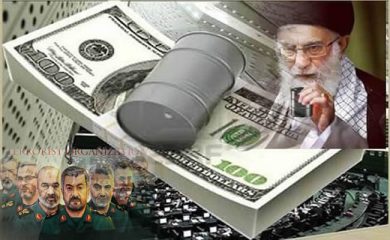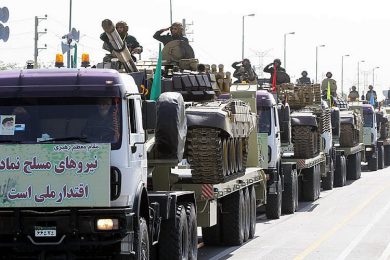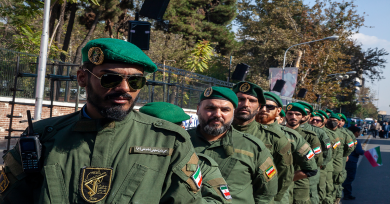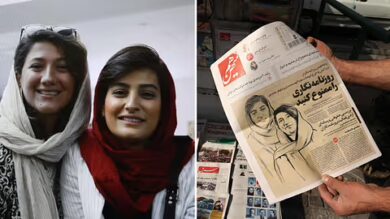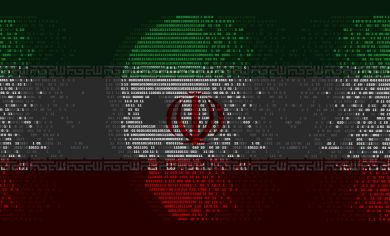The Islamic Revolutionary Guard Corps (IRGC), Iran’s most powerful military and security force, has become the primary enforcer of repression inside the country. Originally established to protect the Islamic Republic, it has transformed into an institution that violently suppresses dissent, monitors and censors the public, and ensures that no opposition movement can successfully challenge the regime. Through mass arrests, torture, forced disappearances, and public executions, the IRGC systematically crushes protests and silences voices demanding freedom, democracy, and human rights.
This report provides an in-depth analysis of how the IRGC targets protesters, activists, and political dissenters, its methods of repression, and the wider impact on Iranian society.
1. The IRGC’s Role in Suppressing Protests
Protests in Iran are frequent due to economic hardship, political repression, and demands for human rights. The IRGC, alongside its paramilitary Basij force, leads crackdowns against demonstrators using brutal force.
A. Major Protests Crushed by the IRGC
The IRGC has been directly involved in violent crackdowns on key protests, including:
1. 2009 Green Movement
• Protesters challenged electoral fraud in the re-election of Mahmoud Ahmadinejad.
• IRGC forces beat, arrested, and killed demonstrators, labeling them as traitors and foreign agents.
• The Basij militia stormed universities, killing students and detaining thousands.
2. 2017-2018 Economic Protests
• Widespread protests erupted over inflation, corruption, and unemployment.
• The IRGC labeled protesters as “seditionists” and conducted mass arrests.
3. November 2019 Fuel Price Protests (“Bloody November”)
• Sparked by a sharp fuel price increase, the protests spread across Iran.
• The IRGC used live ammunition, sniper attacks, and mass arrests.
• Over 1,500 protesters were killed, many shot in the head or chest.
• The IRGC shut down the internet for a week to hide its crimes.
4. 2022-2023 Mahsa Amini Protests (“Women, Life, Freedom”)
• Mahsa Amini, a 22-year-old Kurdish woman, was killed in morality police custody for allegedly wearing her hijab incorrectly.
• The IRGC responded to the nationwide protests with mass arrests, torture, and executions.
• Protesters, many of them women, were shot in the eyes, beaten in detention, and given harsh prison sentences.
B. Tactics Used by the IRGC to Suppress Protests
The IRGC employs a range of brutal tactics to silence demonstrators and prevent the spread of opposition movements.
1. Mass Arrests and Forced Disappearances
• Protesters, journalists, and activists are arrested without trial.
• Many “disappear” for months, with their families unaware of their whereabouts.
• Detainees face sham trials, often sentenced to death or long prison terms.
2. Torture and Sexual Violence
• Human rights groups have documented the use of rape and sexual violence in IRGC-run detention centers.
• Methods of torture include:
• Electrocution, severe beatings, waterboarding, and sleep deprivation.
• Forced confessions, often recorded and broadcast on state TV.
• Psychological torture, including threats against family members.
3. Public Executions and Harsh Sentences
• The IRGC executes political prisoners, often hanging them in public to spread fear.
• Minors, women, and ethnic minorities are disproportionately targeted.
• In 2022 and 2023, multiple protesters were sentenced to death after sham trials.
4. Internet Blackouts and Censorship
• The IRGC shuts down the internet to prevent protest coordination.
• Social media platforms like Instagram, WhatsApp, and Twitter are blocked.
• The IRGC monitors encrypted messaging apps to track and arrest activists.
2. Targeting Activists, Journalists, and Political Opponents
Beyond street protests, the IRGC actively persecutes journalists, human rights activists, and political dissidents.
A. Suppressing Human Rights Defenders
• Lawyers and activists who expose IRGC abuses are often arrested, tortured, or exiled.
• Example: Nasrin Sotoudeh, a prominent human rights lawyer, was jailed for defending women’s rights.
B. Silencing Journalists and Whistleblowers
• Independent media is banned, and journalists covering protests are detained.
• Example: Ruhollah Zam, an Iranian journalist in exile, was kidnapped by the IRGC and executed.
C. Targeting Families of Dissidents
• The IRGC harasses, arrests, and threatens the families of activists to silence them.
• Example: The family of murdered protester Navid Afkari was repeatedly attacked after exposing his wrongful execution.
3. Systematic Oppression of Minorities
The IRGC particularly targets ethnic and religious minorities, labeling them as security threats.
A. Kurdish and Baloch Communities
• Kurdish and Baloch activists face mass executions and forced displacement.
• IRGC forces regularly raid villages, arrest community leaders, and conduct extrajudicial killings.
• Example: In September 2022, IRGC troops killed over 90 Baloch protesters in Zahedan.
B. Religious Persecution
• Baháʼís, Christians, and Sunnis face imprisonment and property confiscations.
• The IRGC shuts down churches and Sunni mosques and arrests faith leaders.
4. The International Response to IRGC Human Rights Violations
Despite clear evidence of crimes against humanity, global responses have been slow and inconsistent.
A. Sanctions Against the IRGC
• The U.S., EU, and Canada have imposed sanctions on IRGC leaders responsible for human rights abuses.
• Sanctions limit IRGC members’ financial transactions and international travel.
B. UN and Human Rights Organizations
• The United Nations Human Rights Council has condemned IRGC crimes, but Iran refuses to cooperate.
• Amnesty International and Human Rights Watch continue to document IRGC brutality.
C. Calls for a Terrorist Designation
• The U.S. has designated the IRGC as a terrorist organization, but the EU and UK have yet to follow.
• Pressure is increasing to officially classify the IRGC as a terrorist entity due to its systematic repression and global destabilization efforts.
5. Recommendations for Action
To hold the IRGC accountable, international actors must take stronger measures.
A. Expand Sanctions
• Target all IRGC-affiliated businesses and front companies.
• Increase restrictions on IRGC officials’ financial assets.
B. Provide Safe Platforms for Iranian Activists
• Strengthen digital security tools to help bypass censorship.
• Fund independent Persian-language media outlets.
C. Support Human Rights Investigations
• Establish UN-backed tribunals to investigate and prosecute IRGC crimes against humanity.
D. Recognize the IRGC as a Terrorist Organization
• The EU and UK must officially designate the IRGC as a terrorist entity, following the U.S. model.
Conclusion
The IRGC’s role in crushing protests and silencing dissent has made it a primary enforcer of oppression in Iran. Through brutality, surveillance, and mass executions, it continues to suppress any challenge to the regime. The international community must act decisively, increasing sanctions, accountability measures, and diplomatic pressure to prevent further human rights violations.
Join Our Newsletter!
Stay informed with the latest updates, news, and ways to take action in the fight for justice and global security. Sign up now to get updates delivered straight to your inbox!

